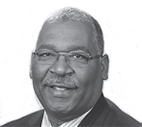Many of us are familiar with the PBS series “Finding Your Roots,” hosted by Dr. Henry Louis Gates. The show’s basic premise is that Dr. Gates helps celebrities trace their ancestry. I have found the show to be quite interesting from a historical perspective. However, inevitably the lineage of the Black guests leads them back to a plantation in some corner of the south, where according to American history, the story supposedly ends. By contrast, other guests of the show can trace their lineage beyond their pre-America roots.
The show reminds the millions of people who have come to America that Africans were forcibly brought here. And while there was probably a certain degree of fear and apprehension from all who made the journey to America, Africans came with a different fear than other immigrants. While all who crossed the sea possessed a fear born of the unknown, Africans’ fears were compounded because they did not choose to come. Consider the implications, loss of family, loss of culture, loss of language and customs. These losses have profoundly affected the progress of Blacks in America, despite the resilience exhibited through more than 400 years of bondage, years of Jim Crow, and the Civil Rights Movement.
The damage to the Black family was and continues to be immeasurable. And the need to explore our history pre-America continues even today. Beginning with Alex Haley’s literary masterpiece, “Roots,” the yearning and fascination to learn of our origins has continued. In his words, Haley translated the oral history of his family’s journey from Africa to America. The oral tradition of passing down history from one generation to the next has been instrumental in preserving our history.
African American traditions such as the family reunion have often provided the perfect setting for continuing the tradition of maintaining the African American family. Family reunions provide opportunities for Black families to reconnect and pass down their shared past and lived experiences. But, of course, due to the horrors of slavery, there will always remain a disconnect. Thus, the need to know more than these annual gatherings can provide remains. The need to seek knowledge about ourselves beyond the shores of this country remains.
The world of genealogy has forever changed, given the technological and medical advances that now allow an individual’s DNA to be their guide. Given that many people may still believe that African American history started in 1619, imagine the changed narrative of African Americans if they learned that their history dates back to the Kingdom of Aksum, the Empire of Ghana, Great Zimbabwe, the Empire of Mali, or the Library of Alexandria.
There is a saying that to achieve a goal, you must first believe that it is possible, and the best way to do this is to see an example. Just as Black History month was created so that Blacks would know their history, so is the power of knowing one’s ancestry. The search for where we come from speaks to the fundamental nature and need to belong. Hence, the need to share in common beliefs and customs; and to be encouraged by the greatness of the past is essential in forging a collective identity. When examining what was lost in coming to America, it was the loss of our identity. To provide counternarratives to the false identities created in an environment of oppression, we must look beyond slavery to find our true roots, regardless of the pain that may accompany such a journey.

